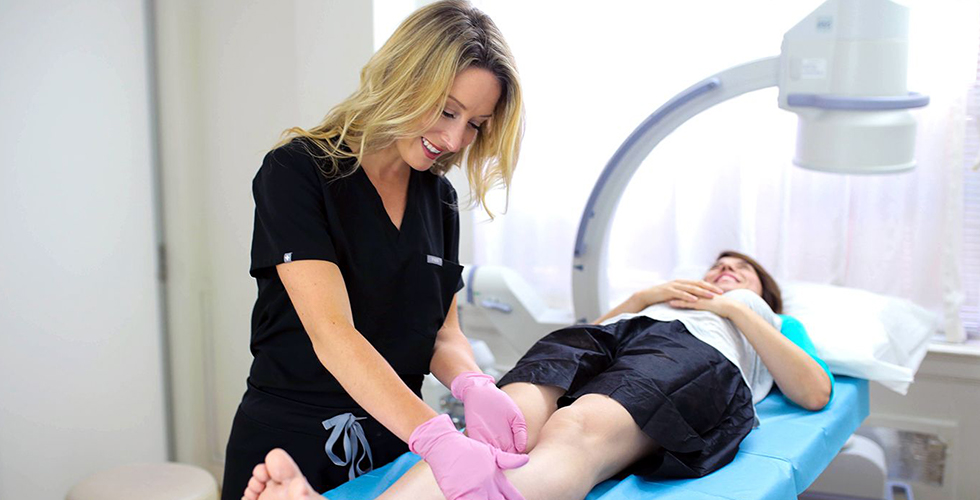Is it worth getting varicose veins removed?
When patients are told they need to undergo varicose vein treatments, they often ask, “is it worth getting varicose veins removed?” This question is usually precipitated by the assumption that varicose veins are purely cosmetic and don’t cause any medical problems. That belief is patently false. If you have spider veins and varicose veins, you must consult a reliable vein doctor to explore your vein treatment options. Below, we describe the root cause of varicose veins and the possible complications of untreated varicose veins.
Varicose veins are dense blood vessels that bulge out of the skin’s surface, looking like a mass of tangled, twisted, and knotted ropes or branches. They’re essentially damaged blood vessels with excessive blood accumulation. Varicose veins certainly look ugly and cause self-consciousness, but they’re also medically dangerous — they’re usually caused by a dangerous circulatory disorder known as chronic venous insufficiency. You need to get your varicose veins tested and removed to prevent the long-term complications of vein disease.
Chronic venous insufficiency is a medical condition wherein the valves in your veins collapse. In healthier veins, the valves act as one-way doors — they allow blood to flow towards the heart, but not backward because of gravity. When your vein valves malfunction or collapse, blood flows backward and accumulates in the leg veins, leading to vascular dilation, spider veins, and varicose veins. Other symptoms of vein disease are leg heaviness, leg pain, frequent muscle cramps, and restless leg syndrome.
When you consult a medical center for vein treatment in Long Island, you can expect a thorough diagnosis and consultation. The vein doctor will use ultrasound diagnostic scans to visualize the root cause of varicose veins and curate a personalized treatment plan. They will treat underlying chronic venous insufficiency before treating varicose veins, thus addressing the root cause of all your problems. That’s why varicose vein treatments are essential — they improve the cosmetic appearance of your legs, enhance your confidence, and improve your vascular health.
Please schedule an appointment to explore your varicose vein treatment options in Long Island.

What happens if you don’t get varicose veins removed?
If you don’t get your varicose veins removed, you may suffer numerous possible complications. Varicose veins are essentially dilated blood vessels with excess blood accumulation. If you don’t seek vein treatment, blood will continue accumulating in the leg veins, leading to increased vascular dilation, which will weaken the walls of your veins. Over time, the varicose veins may burst and cause profuse bleeding, for which you will have to be taken to an emergency room.
In addition to the complication associated with enlarged varicose veins, you may also suffer from the complications of vein disease. As blood continues accumulating in the leg veins, you may experience leg swelling, skin discoloration, leg ulcers (non-healing wounds), and deep vein thrombosis (blood clots in leg veins). If the blood clots in your leg veins break away, they might travel to the lungs, leading to a potentially fatal pulmonary embolism. The risk of deep vein thrombosis is low, but it can’t be ruled out entirely.
That’s why you must contact vein doctors to explore your minimally invasive treatment options.
What are the risks of varicose vein surgery?
Varicose vein surgery is considered a historical or obsolete treatment option for varicose veins. A few decades ago, the only way to remove varicose veins and treat chronic venous insufficiency was through complex surgical procedures, such as vein stripping, vein ligation, and venous bypass surgery. Varicose vein surgeries are complex procedures that involve multiple excisions, general anesthesia, hospitalization, and extended downtime of several weeks. Furthermore, varicose vein surgeries also involve a higher risk of infections, deep vein thrombosis, vein disease recurrence, and other problems.
Fortunately, you don’t need to undergo surgical procedures for varicose veins and chronic venous insufficiency. Thanks to recent advancements in vein care and technologies, vein doctors can treat the root cause of your varicose veins using safe and minimally invasive treatments, such as radiofrequency ablation, endovenous laser ablation, and sclerotherapy. Minimally invasive vein treatments are in-office and outpatient procedures that cause minimal pain and discomfort, carry a negligible risk of complications, and conclude within an hour with no downtime, allowing you to resume your daily activities immediately.
Can you reverse varicose veins naturally?
You cannot treat varicose veins naturally. As mentioned previously, varicose veins occur because of chronic venous insufficiency, a medical condition wherein the collapse of vein valves leads to the accumulation of blood in leg veins. As long as blood continues accumulating in the leg veins, your varicose veins will continue expanding. There’s no way to fix damaged vein valves, so there’s no way to treat varicose veins using natural methods. The only way to treat varicose veins is through minimally invasive procedures that destroy the diseased saphenous vein and reroute the accumulated blood into healthier leg veins.
But while you can’t treat varicose veins using natural methods, you can alleviate the worst symptoms with some lifestyle changes. You should start wearing compression stockings, engage in exercises that activate your calf muscles (running, swimming, cycling, etc.), elevate your legs while sitting down, and avoid sitting or standing in one place for extended periods. These simple lifestyle changes will improve blood circulation and push some of the accumulated blood from your leg veins to your heart, thereby preventing varicose veins from worsening. They won’t treat varicose veins, but they’ll stop it from progressing until you seek treatment.
If you have spider veins and varicose veins, please schedule an appointment at our medical centers for vein treatment in Long Island. When you talk with your doctor, they will provide an overview of your treatment options for varicose veins.